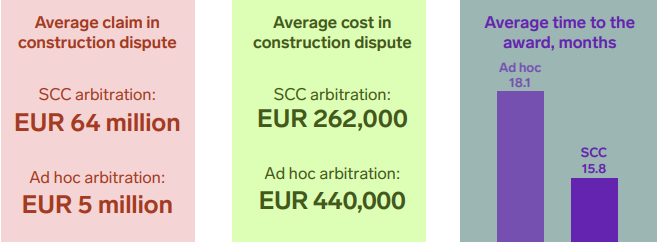Ad hoc vs. Institutional Arbitration in Construction Disputes
Authors:
Natalia Petrik, SCC Deputy Secretary General
Adam Runestam, Associate, Hammarskiöld
Table of contents
Executive Summary
- This report examines and compares construction disputes resolved in Sweden in 2017 – 2022. The report is based on data from 35 ad hoc arbitrations and 25 SCC arbitrations.
- The report confirms that in Sweden, settling construction disputes by ad hoc arbitration is generally more expensive and takes generally longer time than if the arbitration was managed at the SCC Arbitration Institute (SCC).
- The average disputed value in SCC arbitrations is generally substantially higher than the disputed amount in ad hoc arbitrations is. The average disputed value in ad hoc arbitrations is EUR 4.8 million. For SCC arbitrations, that value is EUR 64.1 million.
- On average, a three-member ad hoc tribunal takes 18.1 months to render an award. In regular SCC arbitrations in construction disputes, it takes 15.8 months to render an award. A sole arbitrator in an expedited SCC arbitration takes about 6.4 months, on average, to render an award.
- In SCC arbitrations with three-member tribunals, average costs are about 40% lower than in ad hoc arbitrations.
Background and objectives
This report is based on the results of a survey comparing the procedural features of construction disputes resolved in Sweden during 2017–2022, done in February 2023 by the SCC Arbitration Institute (SCC). The survey was based on data collected from 60 arbitrations: 35 ad hoc proceedings and 25 proceedings under the SCC Rules. The study examines and compares disputed values, costs, length and the number of arbitrators in the two groups of cases. It then benchmarks ad hoc tribunals’ costs against the SCC table of costs applicable at that time.
The study’s objective is two-fold. First, it measures the efficiency of the procedural mechanisms used to resolve construction disputes in Sweden. Second, it outlines each mechanism’s features as well as their ability to meet arbitration users’ specific needs.
Any comparison between ad hoc and institutional arbitration’s suitability and efficiency requires detailed, data supported discussion. However, because of the confidentiality of most arbitrations, such information is not readily accessible by arbitration users or their counsel. This is why the SCC carried out the underlying study and put this report together.
Methodology
Swedish parties tend to incorporate standard contracts, such as AB 04 and ABT 06. In them, disputes are typically settled by ad hoc arbitration making ad hoc arbitration the most common way of resolving construction disputes in Sweden. This has led to the creation of a construction dispute settlement niche, occupied by specialised construction lawyers with the expertise to settle such disputes.
The SCC initiated the underlying survey by contacting arbitration practitioners who had been involved as arbitrators or as counsel in construction disputes resolved under the SCC Rules during 2017–2022. They were asked whether they had acted as arbitrator or counsel in any ad hoc construction arbitrations during that period, and whether they could reveal the following features of those disputes:
- the number of arbitrators,
- the disputed amount,
- the aggregate amount of the arbitrators’ fees and costs.
- the time between the request of arbitration and the final award, and
In total, the SCC received answers about 35 ad hoc arbitrations. Those answers were compared against the corresponding figures in construction disputes administered by the SCC in 2017–2022.
The study compares several figures. It compares the average time to award in ad hoc arbitrations with that in SCC construction arbitrations. It also compares maximum, minimum and average disputed values in ad hoc and SCC arbitrations. It then compares the average disputed value against the costs in each category. The costs are presented as a percentage of certain intervals of claimed amounts to obtain as objective a result as possible. Finally, it benchmarkes the costs in each ad hoc arbitration against the SCC table of costs.
Results of the study
Number of arbitrators
The arbitral tribunal was composed of a sole arbitrator in only 3 of the 35 responses the SCC received concerning ad hoc arbitrations. The corresponding figure in SCC arbitrations was 8 of the 25 surveyed cases, with 1 of those arbitrations conducted under the regular SCC Rules, and the other 7 under the SCC Rules for Expedited Arbitrations.
That means most of the ad hoc arbitrations were conducted by three- member tribunals. This is probably because parties to ad hoc arbitrations tend to rely on the default number of arbitrators (3) established by the Swedish Arbitration Act. In the SCC’s view, the answers received regarding ad hoc construction arbitrations settled by a sole arbitrator are too few for the SCC to draw any conclusions. Therefore, no such conclusions are presented below.
Disputed amounts
There is a wide range of claimed amounts in both ad hoc and SCC construction arbitrations. Of those analysed, the lowest disputed amount for ad hoc arbitrations was EUR 150,000. For SCC arbitrations, it was EUR 54,031.
The highest disputed amount for ad hoc arbitrations was EUR 19.4 million. For SCC arbitrations, that amount was EUR 742.1 million.
The spread between the smallest and biggest claim is larger in SCC arbitrations, as compared to ad hoc arbitrations.
Small claim disputes in ad hoc arbitration in Sweden are infrequent since the Swedish standard contracts, which we mentioned earlier, typically direct parties to pursue court litigation for claims below a specific threshold amount.
Among the 25 surveyed SCC cases, 11 involved claims under EUR 0.5 million, while only 3 of the ad hoc cases surveyed were related to values below EUR 0.5 million. In SCC arbitrations, small claims are usually resolved in SCC expedited proceedings, which provides parties with costeffective alternative both to ad hoc arbitration and to litigation.

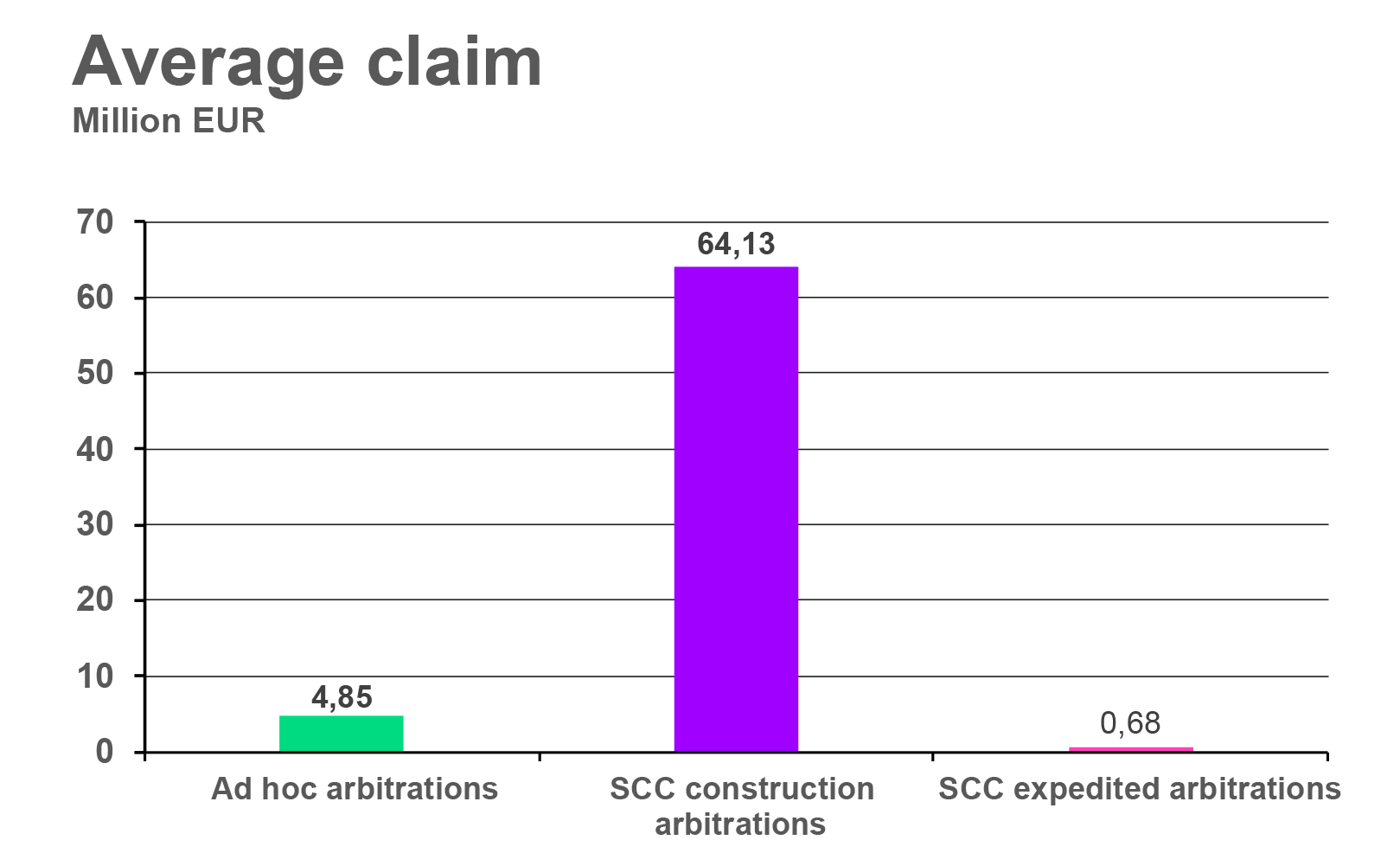
The difference in the highest disputed amounts may indicate that parties to large projects prefer SCC arbitration over ad hoc.
The average claim in an ad hoc arbitration is EUR 4.85 million. For SCC construction arbitrations with three arbitrators, it is EUR 64.13 million. In the cases resolved under the SCC Rules for Expedited Arbitrations, the average claim was EUR 677,543. In other words, construction arbitrations administered by the SCC tend to involve larger claims than those in ad hoc arbitrations.
Average costs
When assessing the costs of an arbitration, it should be noted that ad hoc and SCC arbitrations use different cost calculation principles. SCC arbitrations apply an ad valorem system, whilst ad hoc arbitrations prefer hourly fees. Both systems have their up- and downsides. The ad valorem system binds the fees to the disputed value providing greater predictability on costs. The downside, however, is that ad valorem fees do not always reflect the amount of work demanded by a case. The hourly fee system implies better remuneration for arbitrators but makes calculating the final costs less predictable.
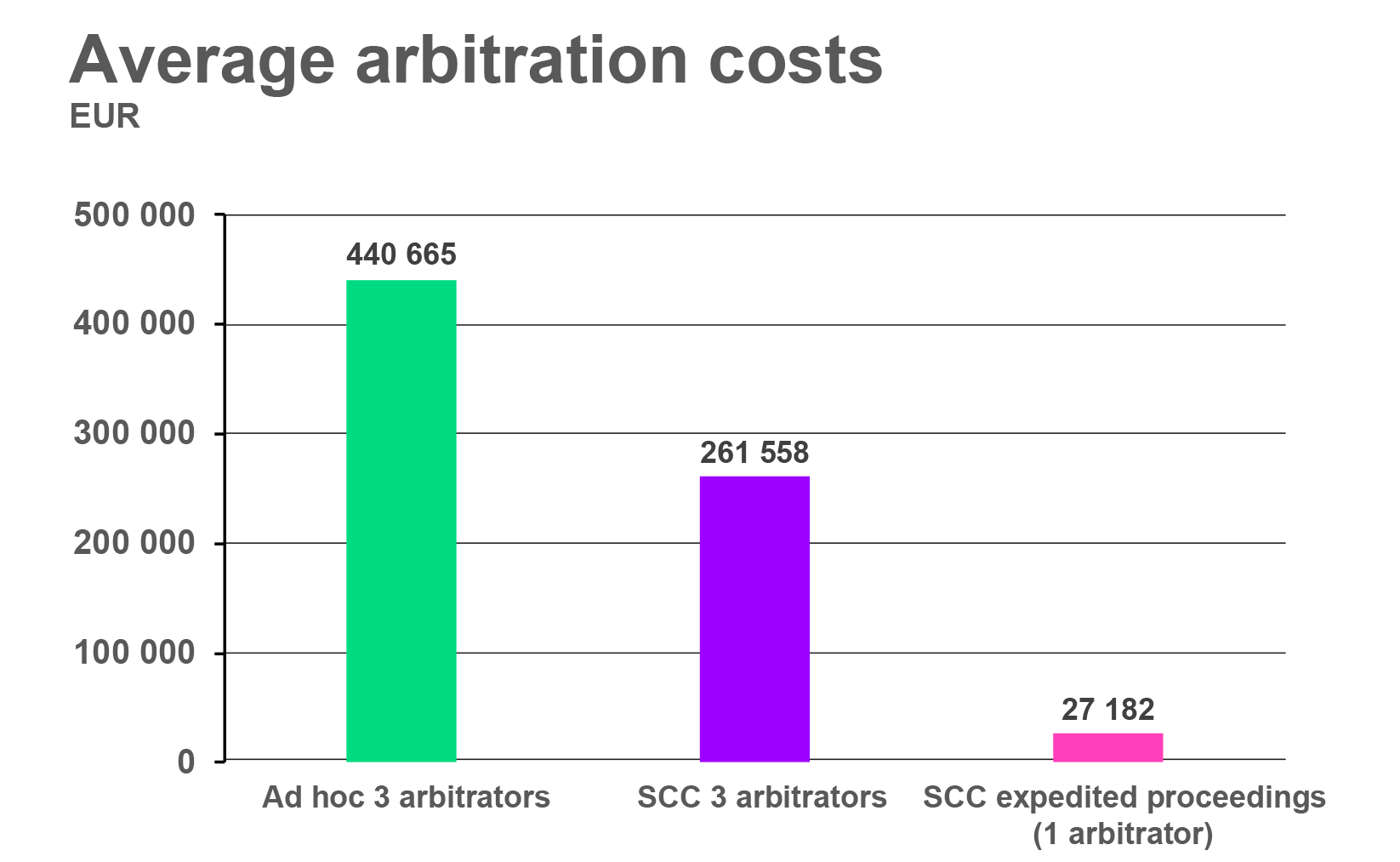
For the purposes of the survey, the respondents estimated the costs of ad hoc arbitrations as the sum of the fees and disbursements of all tribunal members. The parties’ fees for their own counsel are not included in the sums.
Based on the respondents answers, the average cost of an ad hoc construction arbitration was EUR 440,665.
For SCC arbitrations, average costs were EUR 261,558 for arbitrations with three arbitrators and EUR 27,182 for expedited arbitrations with one arbitrator.
Even though the average cost for SCC arbitrations include the SCC’s administrative fee (in addition to the tribunal’s fees and disbursements), average costs in SCC construction arbitrations with three arbitrators were about 40% lower than in ad hoc.
Costs vs disputed value
The chart below groups the surveyed ad hoc and SCC arbitrations according to amount in dispute and presents costs as a percentage of that amount.
The percentage is an average for all the surveyed cases falling within the specified intervals. The majority of surveyed SCC expedited cases had claimed amounts below EUR 0.5 million. As a result, the chart above reflects the costs of expedited proceedings only for this segment of disputed values.
Average costs in ad hoc and SCC standard arbitrations are similar in small-value disputes (up to EUR 0.5 million), if three arbitrators are appointed. However, average costs for ad hoc arbitrations exceed those for SCC arbitrations in all disputes where the disputed value is higher than EUR 0.5 million, regardless of the applicable rules. This despite the fact that the SCC’s costs include both tribunal’s fees and the SCC administrative fee.
As explained above, SCC and ad hoc regimes use different principles for calculating costs. Nevertheless, the percentage of the costs should, in general, be inversely proportionate to the disputed value – irrespective of which system applies (i.e. the bigger the claimed amount, the smaller is the percentage of the costs). However, the average in ad hoc arbitrations indicates significant deviation from this principle in the higher segment of disputed value (EUR 5–10 million). This confirms that costs in ad hoc arbitrations are less predictable.
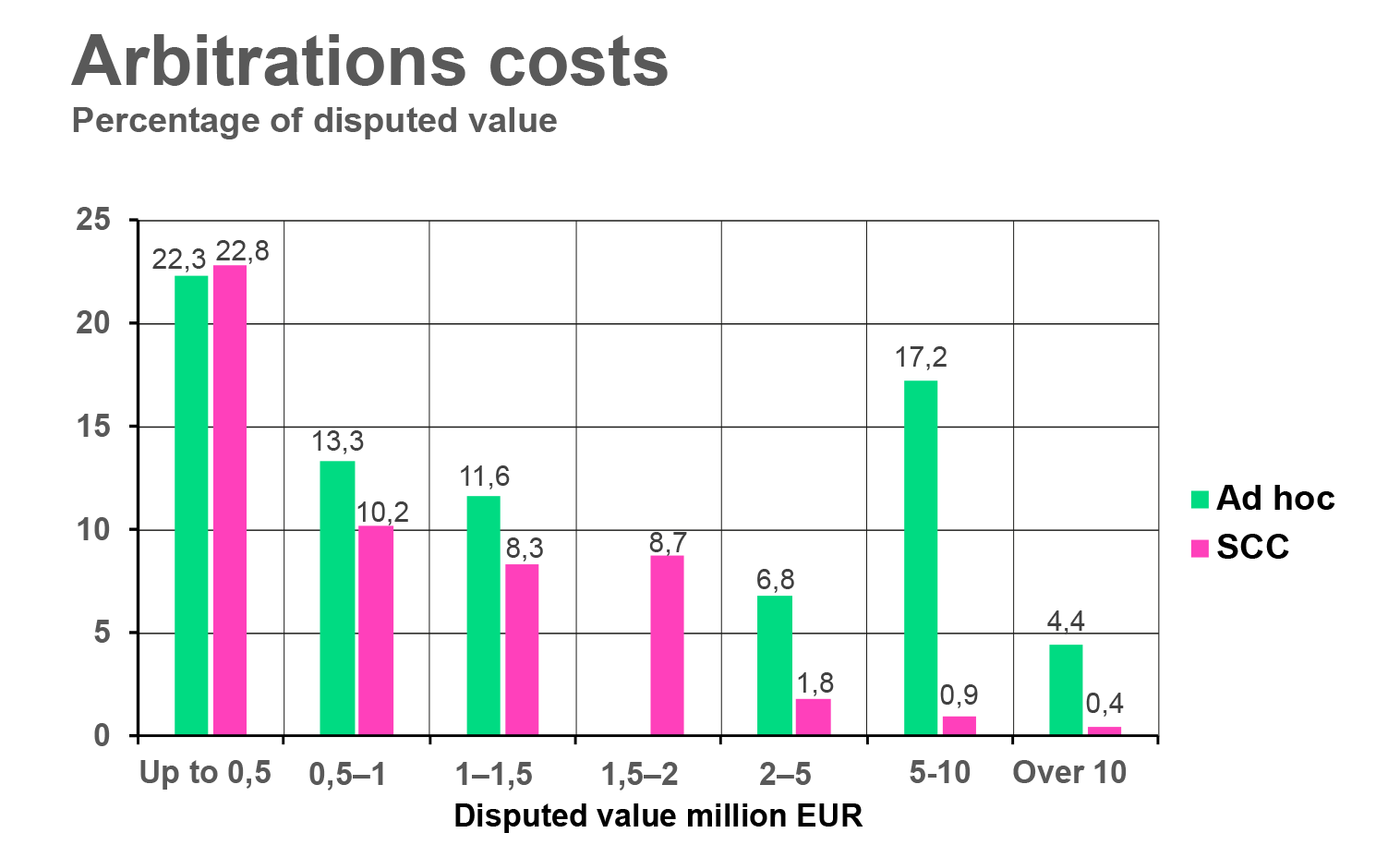
Benchmarking the costs
Following from the above analysis, the overarching picture is that ad hoc construction arbitrations are more expensive than SCC arbitrations. The charts below compare the responses received in ad hoc arbitrations with the SCC table of costs in standard and expedited proceedings. It should be noted that the SCC may adjust the fees up to a certain amount (“the maximum fee”) if the case turns out to be more complex than expected.
In this context, a few respondents expressed views that the SCC rates are sometimes ill-suited to construction cases where, in addition to multiple claims, there are many disputed issues. In other words, a few respondents considered that the size and complexity of construction disputes require arbitrators to work more and hence to be paid more. However, as stated above, the SCC has the power to adjust arbitrators’ fees in accordance with the case’s complexity, when determining the arbitration’s costs. Controlling the costs of arbitration benefits parties to arbitrations.
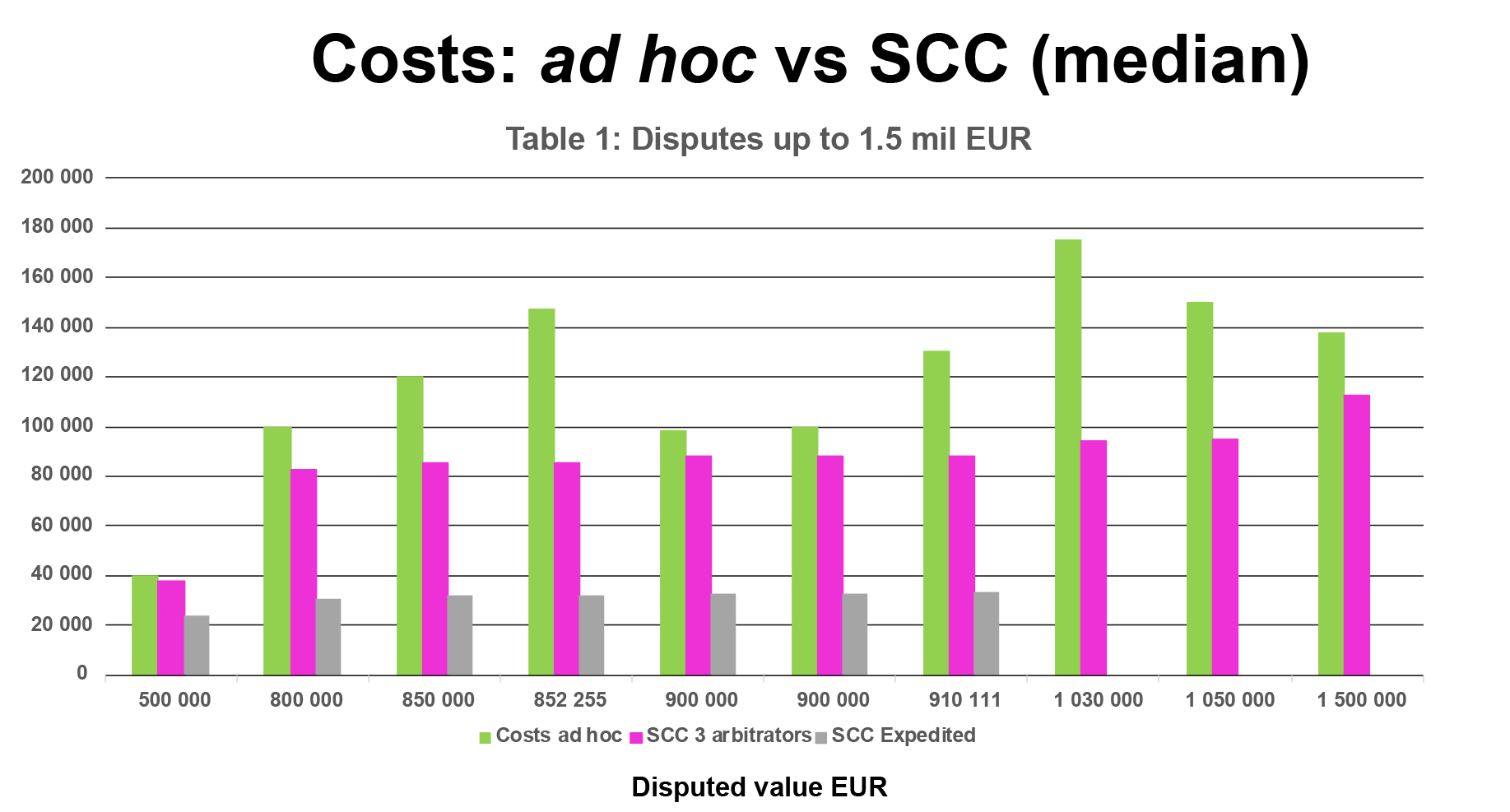
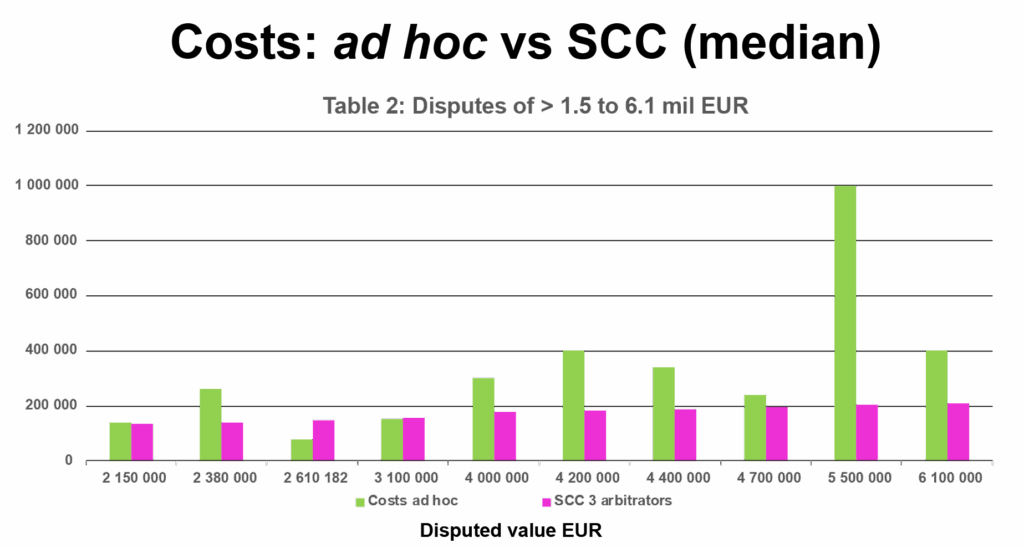
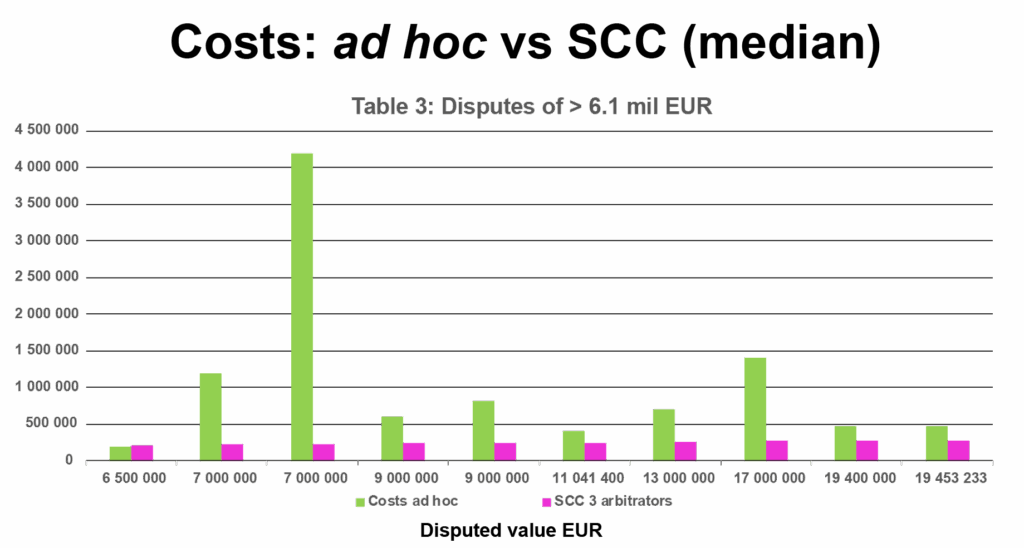
Time to the award
The length of the arbitrations differed greatly between the surveyed ad hoc cases. The fastest full-scale ad hoc arbitration was seven months, while the longest took 60 months from the request for arbitration to the final award. Those times also differed in SCC construction arbitrations. While the shortest arbitration took three months, the longest arbitration took 44 months.
Meanwhile, the average time to award in ad hoc construction arbitrations was 18.1 months from start to finish, whereas the average processing time in SCC arbitrations with a three-member tribunal was 15.8 months. SCC expedited proceedings took 6.4 months, on average.
Regular SCC arbitrations are therefore 2.3 months quicker than ad hoc arbitrations even though SCC cases have higher average disputed values, which implies greater complexity. SCC expedited arbitrations are about three times quicker than ad hoc arbitrations.
The length of an arbitration is a particularly sensitive factor for construction parties, especially if they are forced to pause their ongoing project pending the outcome of the arbitration. The SCC rules set out a streamlined procedure, which lowers the risk of procedural disagreements during arbitration. The SCC applies transparent routines for administering arbitrations. In contrast, in ad hoc arbitrations, the responsibility for case administration is left to the arbitrators, who must split their focus between administrative issues and dispute adjudication. This is arguably more time consuming than would be the case in an SCC administered arbitration.
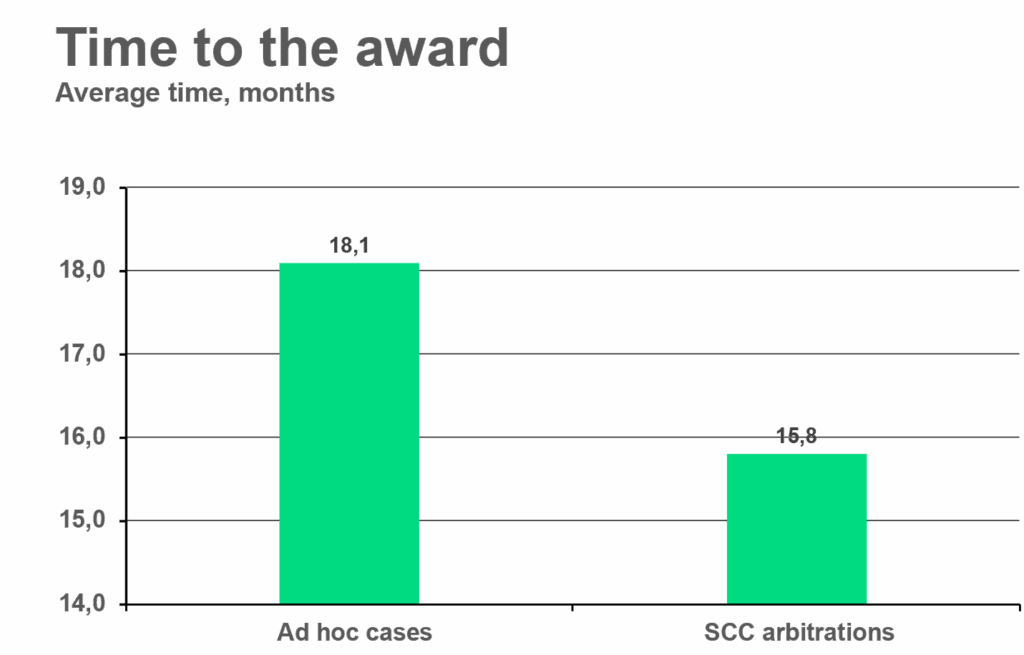
Other parameters to consider
Length of proceedings and costs are not the only relevant parameters when choosing a dispute resolution mechanism. There are other characteristics to consider.
SCC arbitration rules are regularly updated to reflect developments in the arbitration industry and in the users’ needs. Therefore, they incorporate useful procedural mechanisms, which might not be available to parties in ad hoc arbitration. Examples of such mechanisms include emergency arbitration, summary procedure, joinder of parties, consolidation of parallel arbitrations, and multi-contract arbitrations.
Institutional arbitration’s key advantage, however, lies in its system of checks and balances which safeguards the proceedings’ legitimacy and ethical standards. Such a system is implemented through appointment policies, impartiality/independence screening upon appointment, reasoned decisions on challenges, clear rules on fees and compensation for costs, the power to dismiss an arbitrator who does not perform his/her functions, clear procedural deadlines and many other mechanisms to ensure that the tribunal does its job well and the parties have recourse, if any concerns arise.
In short, institutional arbitration rules make it possible to uphold and enforce ethical values, such as expedition, transparency, and diversity.


Conclusions
The above analysis shows that settling construction disputes by ad hoc arbitration in Sweden is more expensive and takes longer than if administered by the SCC. Despite higher costs, ad hoc arbitration offers less procedural efficiency and predictably, and entails a higher risk of procedural complications. It is therefore questionable, from an arbitration user’s perspective, whether ad hoc arbitration is the most suitable dispute resolution mechanism for construction disputes.
The SCC acknowledges that other parameters, such as arbitrators’ expectations for remuneration, have to be considered. Nevertheless, the study provides concrete figures for measuring efficiency – a key factor in evaluating ad hoc arbitration’s suitability in resolving construction disputes.
